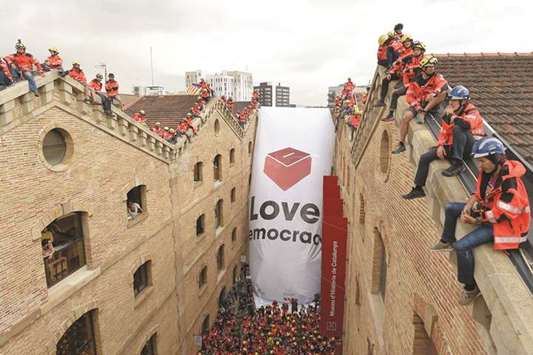Police have seized more than 6mn ballots and envelopes and 100 ballot boxes in a Catalan town, in the latest bid to block a banned independence referendum, a police source said.
The seizures are the latest in a long list of items confiscated by police as Madrid pulls out the stops to prevent the northeastern region from staging the vote on Sunday.
“The Guardia Civil (police force) seized 2.5mn ballots, 4mn envelopes, and 100 ballot boxes in a warehouse in Igualada,” said the source, speaking on condition of anonymity.
These are the first ballot boxes to be seized by police in the crackdown on the referendum.
The source said the company involved alleged the ballot boxes were “for elections at FC Barcelona”, without giving further details.
A spokesman for the football club confirmed that the company had indeed provided FC Barcelona with ballot boxes for elections of its president in the past, but could not comment further.
Catalonia is deeply divided over independence, but an overwhelming majority of people want to vote to settle the matter once and for all, polls show.
The Constitutional Court, though, has ruled the referendum illegal, which is why Madrid is trying to stop it at all costs, using the legal means at its disposal.
Apart from items like ballots and propaganda posters seized, key members of the team organising the referendum were detained last week and then set free pending further investigation.
This sparked angry protests in Barcelona, other Catalan cities and even Madrid.
Websites promoting the referendum have been shut down.
And thousands of police have been deployed to help guard polling stations and stop people from accessing them on Sunday.
But Catalonia’s separatist leaders have vowed the referendum will go ahead, come what may.
“We can go back and print ballot papers as many times as needed, we have the electoral roll, ballot boxes and there will be polling stations,” Raul Romeva, in charge of foreign relations for the Catalan government, told AFP this week.
Meanwhile, at least 10,000 striking high school and university students rallied in Barcelona to defend Catalonia’s right to hold an independence referendum.
“We will vote!” and “Independence!” they chanted as they marched yesterday along the Gran Via, one of Barcelona’s main avenues, blocking traffic.
Many were draped in red and yellow Catalan independence flags.
The showdown is one of Spain’s biggest political crises since the end of the dictatorship of General Francisco Franco four decades ago and it had deeply divided Catalonia.
Opinion polls show Catalans are split on the issue of independence, but a large majority want to vote in a legitimate referendum to settle the matter.
“The majority of young people are separatists, and if they weren’t, they have become separatist after seeing what Spain has done in recent weeks,” 16-year-old high school student Aina Gonzalez told AFP.
Some students have said they may occupy schools and universities that could be used as polling stations, which firefighters and farmers have vowed to protect.
Catalonia’s regional police force, the Mossos d’Esquadra, has warned of the risk of “the disruption of public order” if officers try to prevent people from casting ballots.
But Spain’s central government downplayed the risk of violence.
“If the judge’s orders are carried out ... there is no reason for there to be a violent response on the part of anybody, and I trust this will be the case,” secretary of state for security, Jose Antonio Nieto, told reporters.
Justice Minister Rafael Catala accused Catalan president Carles Puigdemont of “serious irresponsibility” for pressing ahead with the vote and repeated Madrid’s call that the separatists “stop this process”.
Catalonia’s leaders retort that they have a right to decide their future even if it not allowed by the Constitution.
“This referendum does not solve anything, it is a problem because it pits the two sides of Catalonia against each other,” said Alex Ramos, the vice-president of a group that opposes secession called the Sociedad Civil Catalana (SCC).
He said the “silent majority” of Catalans who oppose the referendum would not protest in the streets to avoid raising tensions.
Barcelona’s mayor Ada Colau called for European Union mediation in the stando-ff over the vote in an opinion piece in Britain’s Guardian daily newspaper, writing that the city “does not want a collision with unforeseen consequences”.
Meanwhile media freedom watchdog Reporters Without Borders complained that journalists were the target of pressure from both the pro- and anti-independence camps.
The Bank of Spain warned that political tensions over the independence drive in Catalonia, which accounts for about a fifth of the Spanish economy, put its growth forecasts at risk although it kept them unchanged for this year and the next.
Lorena Torrecillas, a 27-year-old physiotherapist who passed by the student protest, said she opposed independence because the pro-separatist camp had not explained well enough what the advantages of splitting from Spain would be.
“I prefer to remain with what is known than with what will come, because it could be very good or very bad,” she explained to AFP.

Catalan firefighters unfurl a banner depicting a ballot box and reading ‘Love Democracy’ in front of the Museum of History of Catalonia in Barcelona.
